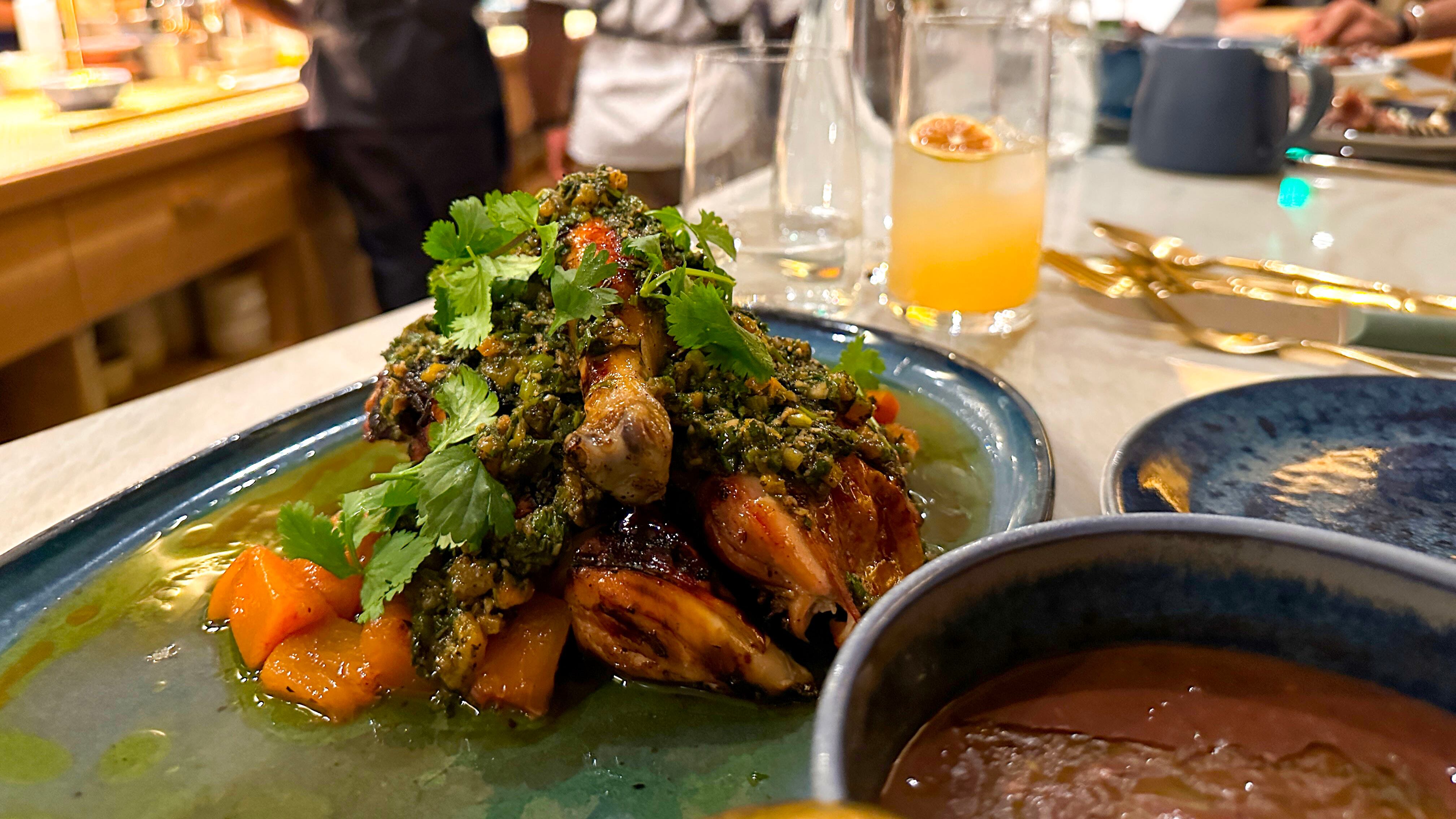If the tale of “The Emperor’s New Clothes” was about a restaurant, Kann would be the emperor.
The new Haitian sensation from celebrity chef Gregory Gourdet is not a great restaurant; it is not even a good restaurant judging by the things that matter: the quality of food and experience diners can expect there. Beyond these fundamentals, Kann is important only in the sense that it is testing how far a credulous dining public can be swayed by the cudgel of celebrity and powerful, scrupulously managed marketing.
For those living under a rock the past few years, Gourdet achieved star status after a run to the finals on Bravo network’s cooking competition Top Chef. Additional appearances followed. He has a national audience. No other Portland chef comes close to Gourdet’s prominence.
Gourdet’s fame is understandable. He is charismatic and mediagenic, does good work in the community, and has a compelling life story—the sort of person who makes television producers giddy. For exacting eaters, however, there has been little information until now about how well Gourdet could cook outside the friendly confines of a tightly choreographed TV production.
Before Kann, Gourdet was the executive chef at Departure, a lightly regarded hotel restaurant best known for its cool-kid bar scene and Gourdet’s annual Peking duck dinners. He left his post there at the end of 2019 to open his own place, a tribute to his Haitian heritage. Ever since, local sycophants have relentlessly pumped Kann as the next big thing. Disclosure of its location in late 2021 was treated as breaking news. The buildout reportedly cost around $2 million. It employs a national public relations firm. There are investors.
The final run-up to its public launch in August involved at least two weeks of half-price meals for local chefs and friends of the house. National media outlets managed to make it in for early looks. The Robb Report, a magazine aimed at the sort of people who collect six-figure watches and own eight-figure executive jets, wrote enthusiastically about Kann the same day it opened. A New York Times writer had it on a national top 50 list within a month. It is not hard to discern the behind-the-scenes machinations at work here.
I visited Kann twice in September with a companion. We ate our way through most of the menu.
It is a nicely appointed room, seating roughly 75. The big, open kitchen is entertaining. But the most indelible impression was the wave of noise bouncing off all the hard, angular surfaces. It measured a steady 85 decibels, comparable to a power mower, making normal conversation all but impossible. My ears rang afterward. Gourdet acknowledged noise is a problem. It is unclear if a fix is in the works.
Another troubling flaw: Even if you could hear your partner, the seating is uniquely ill-suited to a night out for two. Most seats are either at the kitchen counter or tables built for four or six. There are a handful of smaller tables in the narrow space between the kitchen and streetside windows, but during my visits, they were all pushed together. So much for a hot date.
Wonderful food might be enough to overcome the experiential lapses. The news on this front is disappointing. Kann has chosen to limit itself by eschewing all gluten and dairy. A laudable idea to some, I am sure, but not at the expense of delivering appetizing food. And that, along with multiple flaws in execution, made eating at Kann a slog.
Brioche without butter or gluten is not brioche. Two “warm plantain brioche muffins” ($10) were dense, pasty and unappetizing. They are served with epis butter, a coconut oil-sunflower oil spread never to be confused with the real thing. Our server explained that epis is a Haitian spice blend used throughout the menu. The nonbutter tasted overpoweringly of raw garlic.
Another defect that weaves its way through a meal at Kann is excessive, monotonous habanero (or its first cousin, Scotch bonnet) heat. Have you ever sweated your way through a dish so blisteringly hot, but so delicious, you couldn’t stop eating it? Now, imagine its evil twin. The side dish of pikliz ($8), described as “spicy pickled cabbage,” was all blister and no deliciousness, the flavor of any pickling spice all but absent. Likewise, the blast of capsaicin in September’s shaved watermelon ice mounded over the butterfish starter ($25) obliterated any flavor of melon or fish.
Other missteps: fried sweet plantains ($9) that were partly uncooked inside and so sodden with oil that they oozed to the touch, and a glazed duck main dish ($56) scorched to stringy chewiness on one side, probably from sitting over the hearth too long before final preparation. No-proof drinks and desserts both tended to be excessively sweet.
Not all is lost at Kann. Ironically, two dishes least obviously related to Haiti (or the Pacific Northwest)—a humongous smoked beef rib ($92), most at home in Texas, and a whole branzino ($49), typically associated with the Mediterranean Sea—were fine. Perhaps the best-tasting item was Haiti’s national dish: griyo ($14), chunks of succulent braised pork, though it is relegated to the slate of starters and is accompanied by a mound of the hellfire cabbage pikliz.
The unfortunate verdict on Kann and its chef is that television celebrity does not equate to restaurant kitchen mastery. By contrast, a tried-and-true winning formula is a burning passion to please, a commitment to quality, and subjugated egos. Perhaps this is what is missing.
EAT: Kann, 548 SE Ash St., 503-702-0290, kannrestaurant.com. 4-10 pm Wednesday-Thursday, 4-11 pm Friday-Saturday.
